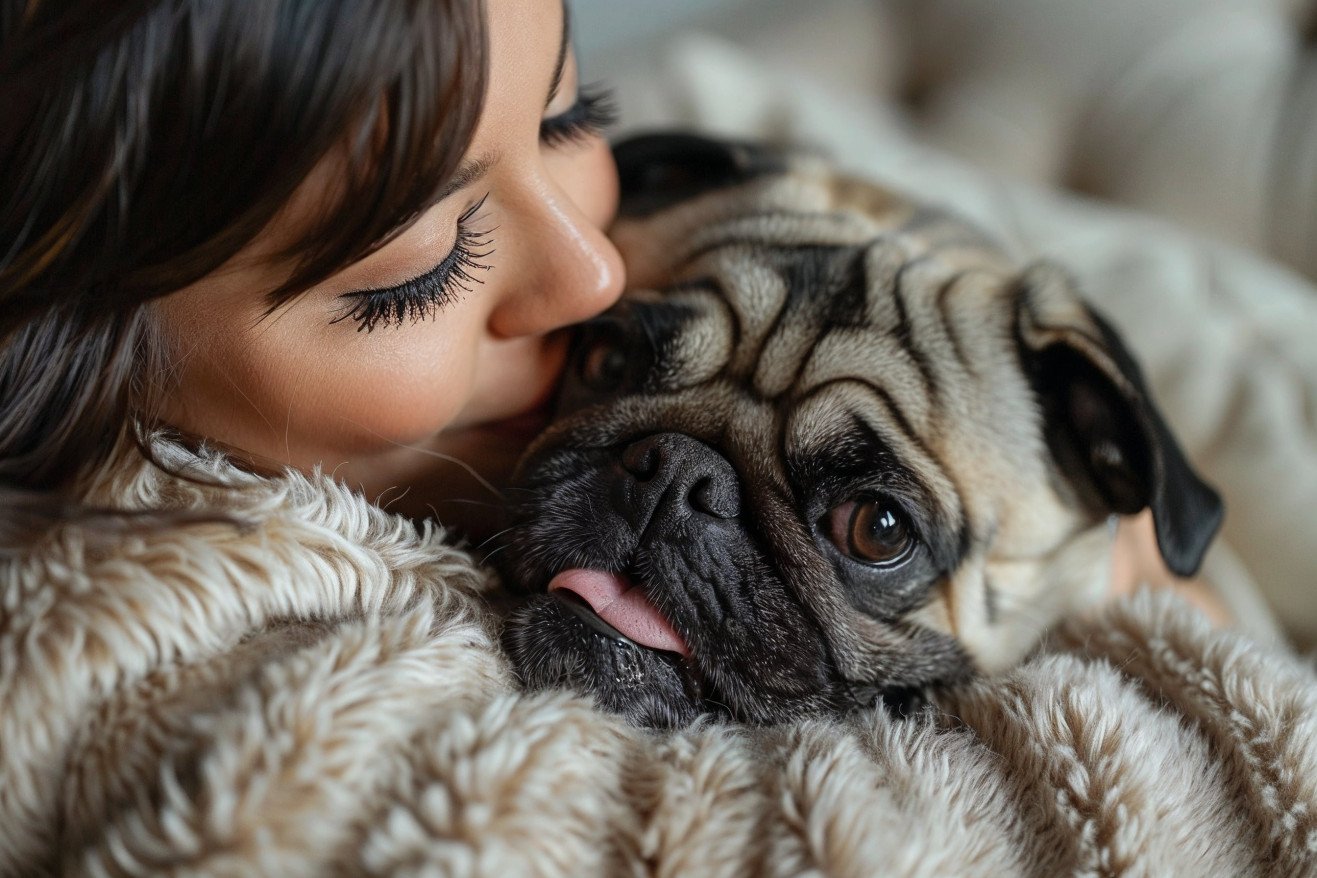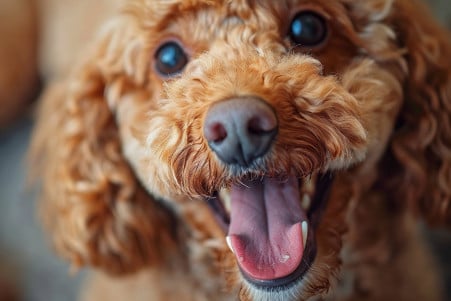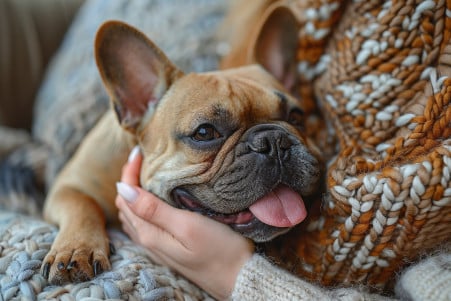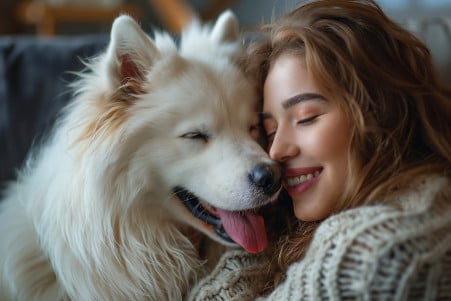Why Does My Dog Lick My Nose? Unveiling Affectionate Behavior
20 April 2024 • Updated 19 April 2024

If you’ve ever wondered why your dog seems to love licking your nose, you’re not alone. So, why do dogs lick human noses? It turns out there are a few reasons, including to show affection, to use their sense of smell to learn more about you, and to taste the salt on your skin. There’s even a chance that your dog is trying to initiate a game of tug-of-war by licking your nose to get your attention.
To find out more, we’ve looked at scientific research in the fields of animal behavior, evolutionary biology, and sensory perception. By exploring the possible reasons behind this cute behavior, you’ll learn more about your dog’s natural instincts, their needs, and how they communicate with their human family members.
Why does my dog lick my nose?
Evolutionary Roots of Nose Licking
The behavior of licking the nose of a human or another dog has deep evolutionary roots that can be traced back to the wild ancestors of domestic dogs. According to Zigzag, the behavior of puppies from species like wolves and coyotes licking their mother's face was to stimulate the regurgitation of semi-digested food when she returned from a hunt. This would enable the puppies to eat and, therefore, increase their chances of survival. In addition, as pack animals, licking was a way for canids to communicate the location of prey or warn of potential threats, which would help maintain the social structure of the pack.
While the original reason for licking to obtain food is no longer necessary, the behavior of licking the nose of humans or other dogs is still present in today's domestic dogs, who have inherited it from their wild ancestors. However, as the American Kennel Club points out, the reason for licking has changed and is now primarily a way to show affection, greet, and bond with their human family members.
The licking action also releases endorphins, which can create a sense of comfort, similar to the feeling puppies had when their mothers licked them. Therefore, while the reason for the behavior has changed, nose licking is still an important part of a dog's behavioral repertoire, enabling them to communicate with their "pack" members.
Licking as a Form of Communication
Dogs often lick their owners to communicate with them and with other dogs. As explained by PetMD, licking can be a sign of submission, friendliness, and respect. It can also be a way for dogs to get attention or let their owners know they want to play. On the other hand, as mentioned by PawSafe, licking can also be a sign of stress, anxiety, or a need for personal space.
The key to understanding why a dog is licking is to look at the situation and the dog's body language. According to PetMD, dogs don't understand the difference between positive and negative reinforcement, so when they lick, they're often just looking for attention, whether it's good or bad.
Causes of Excessive Licking
Some dogs may lick more often or more excessively than others. According to The Spruce Pets, excessive licking can be a symptom of an underlying medical issue, including allergies, skin problems, or dental issues. It can also be a sign of anxiety, boredom, or obsessive-compulsive disorder (OCD), according to USA Today.
Some dog breeds, especially those with brachycephalic (short) muzzles, are more likely to lick excessively, according to PetsBest. Environmental factors, such as stress or a change in routine, can also lead to excessive licking. Up to 60% of dogs that lick excessively may have an underlying gastrointestinal issue, according to PetsBest.
Potential Health Risks of Dog Licking
While the occasional dog lick is generally harmless, excessive or unclean licking can lead to health problems. The New York Times notes that a dog's mouth contains an "enormous oral microbiome of bacteria, viruses and yeast" that can lead to infections in humans. The Washington Post adds that people with weakened immune systems, the elderly, and those with open wounds are at a greater risk of developing severe bacterial infections, such as Capnocytophaga canimorsus, from dog licks.
In addition, if a dog licks a person's face after they've applied certain cosmetics or household chemicals, it can lead to toxicity. Rover.com points out that if you have products on your face that contain toxic ingredients, your dog could get sick from licking them off. These health risks can be minimized through good hygiene, such as washing up after being licked, and avoiding mouth-to-mouth contact.
How to Train and Correct Unwanted Licking
If you find that your dog's licking is excessive or unwanted, there are a number of training techniques that can help to curb the behavior. Wag! explains that positive reinforcement methods, like training your dog to not lick and then rewarding them for doing so, can be effective. Meanwhile, Dogster suggests that training your dog to focus on a different activity or toy when they start to lick can also be helpful.
It's also important to make sure that any medical or behavioral issues that may be contributing to the licking are addressed, according to PetsRadar. Meanwhile, all of the experts agree that training should be consistent, patient, and free of punishment. By focusing on positive reinforcement and making sure that any underlying issues are resolved, you can successfully train your dog to stop licking.
Conclusion: Should You Let Your Dog Lick Your Nose?
Nose licking is a natural and instinctive behavior for dogs, rooted in their evolutionary history. While licking can be a sign of affection and communication, excessive or unhygienic licking may pose health risks. Understanding the context and reasons behind a dog's licking can help owners decide whether to embrace or manage the behavior.
According to Dogster, dogs lick their owners' faces as a way to show affection and strengthen social bonds. This behavior stems from the instinctive need of puppies to lick their mother's face to stimulate regurgitation of food, as explained by Zigzag. Licking releases endorphins in a dog's brain, making them feel relaxed and happy.
Dogs may also lick noses to explore interesting smells and tastes on human skin, according to PetMD. Nose licking can be a greeting, a way to get attention, or a sign of stress and anxiety in some cases, as noted by PawSafe.
If licking becomes problematic, positive reinforcement training and addressing underlying causes can effectively discourage it, as suggested by Wag! and Dogster. Ultimately, building a strong bond with your dog and respecting their natural behaviors is key.


